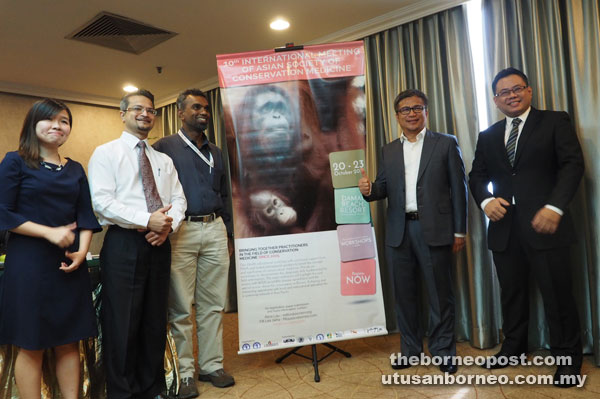
Dr Annuar (second right) together with (from left) Dr Lau, Dr Rueben, Dr Azlan and Manshor in a group photo after revealing the poster of the 10th International Meeting of the Asian Society of Conservation Medicine (ASCM).
KUCHING: The 10th International Meeting of the Asian Society of Conservation Medicine (ASCM) will be held at the Damai Beach Resort in Kuching from Oct 20 to 23.
With the tagline ‘One Health in Asia Pacific’, ASCM aims to establish an Asian Pacific network for conservation medicine, including zoonotic and wildlife diseases surveillance as well as ecosystem health.
The annual conference was last held in Taipei, Taiwan, and this year is the first time it will be held in Sarawak.
Chairman of ASCM 2017 Dr Reuben Sunil Kumar Sharma hoped that the conference will attract more participants from the region especially Korea, Taiwan and so forth.
“We have about 300 participants both international and local annually but we are hoping more people will come this year,” he told a press conference held at Grand Margherita Hotel here yesterday.
Present were Assistant Minister for Science Research and Biotechnology Dr Annuar Rapaee, ASCM secretary Dr Alice Lau Ching Ching, Universiti Malaysia Sarawak (Unimas) Head of Department of Zoology Associate Prof Dr Mohd Azlan J. Azad and Damai Beach Resort general manager Manshor Yusup.
Dr Annuar noted that Sarawak, with its rich biodiversity, makes it an ideal location to converge specialists, experts and professionals in different fields of study to zoom into conservation medicine and beyond.
“The rich biodiversity allows us to see and study the pattern of diseases as changes in the environment will definitely effect not only animals but human beings as well,” he said.
“The research into development of animal diseases are equally important as it is an area that is not easy to tackle. For example, leptospirosis that originated from mice, diagnosing and treating the disease is not easy,” he explained.
In bringing together ecologists, zoologists, veterinarians, medical practitioners, environmental experts and specialists in other fields, Dr Annuar pointed out that the conference was a crucial platform to further study on ways to tackle various diseases and related problems not only in Asia but around the world.
“The movement of the human population is fast nowadays and we have to face and address some of the important issues urgently including zoological diseases,” he said.
“With Unimas on board in organising this conference, we hope to do some research collaboration because there are enormous potential in our biodiversity,” he added.
Elaborating further, Dr Annuar revealed that the Sarawak Biodiversity Centre (SBC) has been tasked to create an inventory on substances which can be used for health.
“We have identified more than 20,000 substances which can be used in the future,” he said.
One of the important plants involved are the Bintangor species which he said can used to fight against HIV (human immunodeficiency virus).
“The first phase in its study and research has been completed and we are about to embark on phase two soon. Budget to conduct research and trial are huge and we are still looking for partners,” he said.
“The result obtained thus far has been very encouraging in terms of fighting HIV,” he added.
In light of the discovery, he thus stressed the importance of conservation and protection of the state’s biodiversity and ecosystem for human wellbeing and health as well as economy.
Meanwhile, Dr Azlan pointed out that the conference is vital to send a strong message that Sarawak is concerned and aware of the importance of animal welfare and wildlife conservation to the international community.
Registration to the conference will be open on March 1, with a special early bird price of US$150 for all registrations made between March 1 and May 31.
The normal rate thereafter is USD180 per person and a special price of US$60 for students up to the last day of registration on Sept 20.
The conference includes pre-congress educational workshops on Oct 20.
In line with the event, ASCM is also calling for submission of original papers.
The categories for paper submission are basic science, infectious diseases, marine mammal, primate, bear, elephant, avian medicine, clinical medicine, reptile and amphibian, parasitology, pathology, wildlife management and conservation, rehabilitation medicine and networking.
Registrations can be made through ASCM website at www.ascm2017.com.
For more information on the event, email [email protected] (Alice) or [email protected] (Fifi) or call 082-555189.
